

BWAD Commitee 2015 - Google Docs. Straight from the DOE: Dispelling Myths About Blocked Sites. Over the past few weeks, I’ve been hearing from frustrated teachers about surprising websites their schools block — everything from National Geographic to Skype.
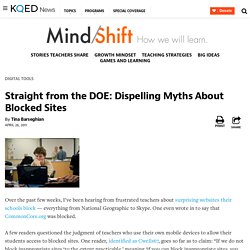
One even wrote in to say that CommonCore.org was blocked. A few readers questioned the judgment of teachers who use their own mobile devices to allow their students access to blocked sites. We Trust You 2013. Rosemary of New Canaan High School describes Somewhat Virtual Book Club (SWVBC) Exploring mind amplifiers since 1964. Advocacy, Legislation & Issues.
Cipa. Banned Web Sites: Are Your Policies Up-To-Date? In looking over an assignment to develop a library reconsideration policy that I gave to my graduate students, it occurred to me that an important information element is missing.
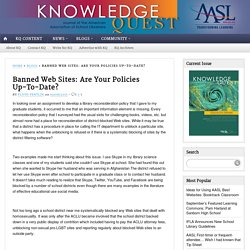
Every reconsideration policy that I surveyed had the usual slots for challenging books, videos, etc. but almost none had a place for reconsideration of district-blocked Web sites. While it may be true that a district has a procedure in place for calling the IT department to unblock a particular site, what happens when the unblocking is refused or if there is a systematic blocking of sites by the district filtering software? Two examples made me start thinking about this issue. I use Skype in my library science classes and one of my students said she couldn’t use Skype at school. It's 404 Day! Join Us In Protesting Internet Censorship in US Schools and Libraries. Digital Citizenship.
Teacher Resources. » Resources. Media and Technology Resources for Educators. What filters hide: a lesson. Title What filters hide DescriptionStudents will research common net issues with filtered sites.
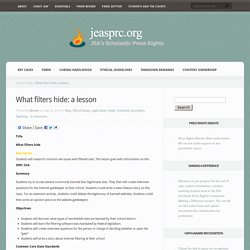
This lesson goes with information on this SPRC link. Summary. ABA Law Day: For Schools: Lessons: High School Students: Teaching About Freedom of Speech on the Internet. High School Students Teaching About Freedom of Speech on the Internet Many libraries and schools have installed filters on their computers to restrict Internet access.
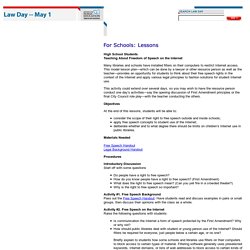
This model lesson plan—which can be done by a lawyer or other resource person as well as the teacher—provides an opportunity for students to think about their free speech rights in the context of the Internet and apply various legal principles to fashion solutions for student Internet use. This activity could extend over several days, so you may wish to have the resource person conduct one day’s activities—say the opening discussion of First Amendment principles or the final City Council role play—with the teacher conducting the others. Should schools block websites? Speak Outs - Should school libraries restrict access to the Internet? Should school libraries restrict access to the Internet?
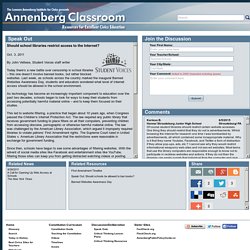
Oct. 3, 2011. Herdict : At-A-Glance. Reporter: Test Sites Lists Add details to report » Fewer details » Accessible Inaccessible We collect limited information when you report sites.
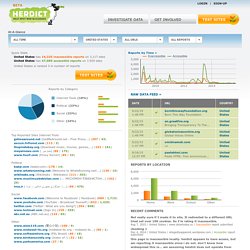
Learn more here. HerdictWeb. Herdict : Home. Children's Internet Protection Act. The Children's Internet Protection Act (CIPA) was enacted by Congress in 2000 to address concerns about children's access to obscene or harmful content over the Internet.
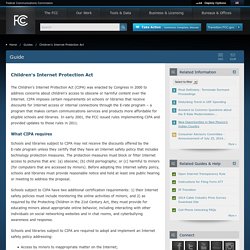
CIPA imposes certain requirements on schools or libraries that receive discounts for Internet access or internal connections through the E-rate program – a program that makes certain communications services and products more affordable for eligible schools and libraries. In early 2001, the FCC issued rules implementing CIPA and provided updates to those rules in 2011. What CIPA requires Schools and libraries subject to CIPA may not receive the discounts offered by the E-rate program unless they certify that they have an Internet safety policy that includes technology protection measures. Web-Filtering-Guide. Championing Internet Access for Students on Banned Websites Awareness Day. Children's Internet Protection Act.
NetSmartz. Tech-savvy kids breach security, cause recall in iPad project for L.A. schools. Editor’s note: The Los Angeles Unified School District is not scrapping its iPad program, as an earlier version of this story stated.
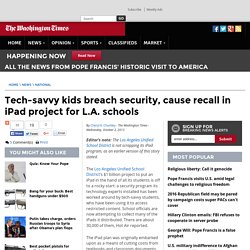
The Los Angeles Unified School District’s $1 billion project to put an iPad in the hand of all its students is off to a rocky start: a security program its technology experts installed has been worked around by tech-savvy students, who have been using it to access restricted content. School officials are now attempting to collect many of the iPads it distributed. There are about 30,000 of them, Hot Air reported. The iPad plan was originally embarked upon as a means of cutting costs from textbooks and classroom documents. The idea was that if students had iPads — and those devices were coded so that students could only access what teachers wanted them to view via preloaded educational software — then the upfront technology costs would soon be recouped. Championing Internet Access for Students on Banned Websites Awareness Day. Posted on behalf of the AASL Banned Websites Awareness Day Committee It’s happened to all of us– we’re at school trying to access the perfect website for a learning activity at school and…. it’s blocked.
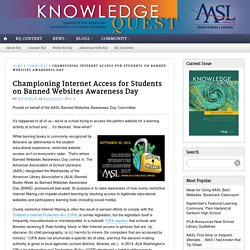
Now what? While banning books is commonly recognized by librarians as detrimental to the student educational experience, restricted website access isn’t on everyone’s radar. That’s where Banned Websites Awareness Day comes in. The American Association of School Librarians (AASL) designated the Wednesday of the American Library Association’s (ALA) Banned Books Week as Banned Websites Awareness Day (BWAD, pronounced bee-wad).
Overly restrictive Internet filtering is often the result of earnest efforts to comply with the Children’s Internet Protection Act (CIPA) or similar legislation, but the legislation itself is frequently misunderstood or misinterpreted. Filtering on school networks is an issue of crucial importance. Banned Web Sites: Are Your Policies Up-To-Date? Education Talk Radio Online Radio by EDUCATION TALK RADIO PRE K -20. A guest post from AASL’s Banned Websites Awareness Day Committee. Freedom to Read Foundation. Cipa_report. NeverEndingSearch — @joycevalenza by Joyce Valenza. Home - Doug Johnson's Blue Skunk Blog.
Banned Websites Awareness Day. Banned Websites Awareness Day 2015. About. Banned Books Week is the national book community's annual celebration of the freedom to read.
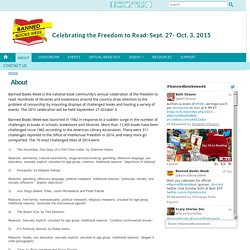
Hundreds of libraries and bookstores around the country draw attention to the problem of censorship by mounting displays of challenged books and hosting a variety of events. The 2015 celebration will be held September 27-October 3. Banned Books Week was launched in 1982 in response to a sudden surge in the number of challenges to books in schools, bookstores and libraries. Knowledge Quest September October 2015 by American Association of School Librarians.